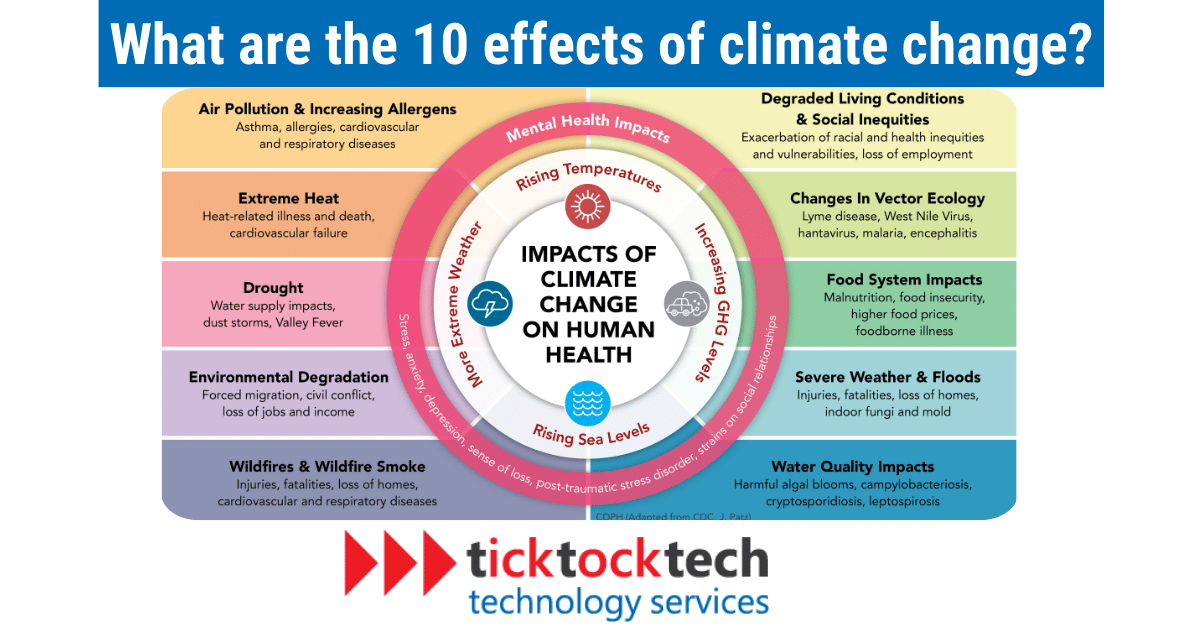Climate change is the long-term change in Earth’s temperature and weather patterns. This is largely driven by human activities like burning fossil fuels, deforestation, industrial processes, and agriculture. These activities release greenhouse gases like carbon dioxide (CO2), methane (CH4), and nitrous oxide (N2O) into the atmosphere. These gases trap heat and cause global temperatures to rise.
Related: What does carbon neutral mean and what is net zero?
Effects of Climate Change
Climate change has many effects on the world. These effects impact every part of life on Earth. Let’s look at ten of its most crucial effects:
1. Rising global temperatures
The notable effect of climate change is the rise in global temperatures. This is caused by greenhouse gases trapping heat in the air. This will lead to a rise in heat waves that can harm health and agriculture.
2. Melting ice caps and glaciers
Ice caps and glaciers are melting faster because of global warming. This raises sea levels and threatens coastal communities. This also disrupts animal habitats in the icy regions.
3. Sea level rise
Melting ice causes sea levels to rise. This leads to coastal erosion and more floods around the world. Lowlands areas may have to be abandoned in the future due to this huge risk.
4. Ocean acidification
Carbon dioxide emissions getting absorbed by the oceans lower the pH levels of the water. This harms sea life like shellfish and coral reefs. This will also affect marine food chains and industries dependent on fish.
5. Extreme weather events
Climate change makes extreme weather events like hurricanes, heavy rainfall, and droughts more severe. These weather events can destroy lives and properties.
6. Loss of biodiversity
Rising temperatures and changing ecosystems put many species in danger of extinction. This weakens the ecosystem and reduces important processes like pollination and water purification.
7. Disrupted agriculture
Climate change affects cropping seasons and increases extreme weather events. This can lead to crop damage from droughts, heat stress, and unpredictable rainfall patterns. This eventually compromises food production.
8. Water scarcity
More water evaporates as temperature increases, which leads to shortage. This shortage is particularly severe in dry regions like deserts. Communities in these areas face challenges accessing clean drinking water and adequate sanitation. This could have a massive impact on agriculture and domestic needs.
9. Health risks
Rising temperatures expand the range of mosquitoes, like those transmitting malaria and fever. According to the World Health Organization, climate change poses significant health risks. These risks include heat-related illnesses and respiratory problems.
10. Economic impacts
Climate change has extensive economic consequences affecting agriculture, health care, and disaster recovery costs. Businesses may need to invest heavily in new technologies and infrastructure to adapt to these changes.
Related: What is the Great Reset Initiative?
Frequently Asked Questions
Human activities like fossil fuel combustion and deforestation, are the main causes of climate change. These activities release greenhouse gases into the atmosphere which leads to increased global temperatures.
It disrupts habitats, food availability, and migration patterns. This forces animal species to adapt or face decline and potential extinction.
Renewable energy sources like solar, wind, and hydropower, reduce greenhouse gas emissions. This contributes to the prevention of climate change.
Conclusion
Addressing the impacts of climate change requires global collaboration. Understanding these effects and taking suitable actions can reduce risks and protect the planet. Raising public awareness is also essential in combating climate change. We must all implement measures now to collectively ensure a sustainable future.

